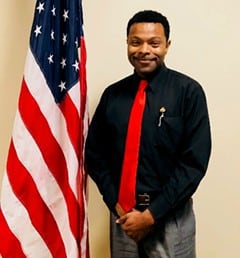When Daniel Moss got a job offer from Deloitte, he thought it was too good to be true.
Moss, an ex-Navy air traffic controller, had struggled re-adjusting to civilian life after his almost-six-year military stint. Upon returning to his hometown of Columbus, Ohio, he enrolled at Wright State University but couldn’t find steady employment. His wife ended up divorcing him, and he spent two years homeless, sleeping in his college library and showering at the gym.
One day, he came across an advertisement in a print publication of the Navy Times for NS2 Serves, a free program that provides veterans with information-technology training and helps them find a job to put their newfound certifications and skills to good use. Moss applied, eventually graduated and in November received an offer letter for an IT solutions analyst job with Deloitte.
“I already didn’t believe the program was real … and then to hear that Deloitte was going to give me a job, it just seemed too good to be true,” Moss said. “I’m still very, very confused even today sitting at work right now.”
Laura Carmack, NS2 Serves’ vice president of recruitment, said that she hears stories like Daniel’s all too often from veterans.
“A lot of them have been like Daniel, where they got out of the military and think they’re going to get out and have no problems finding a job,” she said. “A lot of them really struggled finding that employment. Part of that is: The private sector isn’t great at understanding those skill sets.”
That’s a common refrain among those who work with veterans. Many of the skills they pick up during their military services are easily transferable to other industries, but recruiters often either don’t realize that or are looking for a specific skill set that requires additional education.
That’s the vicious cycle Moss found himself unable to escape from after his service ended. He said he stopped counting the number of jobs he applied to once he hit 1,100. Moss was 25, homeless and trying to get his life together, both for his sake and that of his 11-year-old daughter, Jaylen.
“It was really tough … to not have work, to not find housing for myself, to not be the same person I’ve been since middle school,” he said. “I’m an average student, but I work hard. All my hard work was proving to be for nothing.”
He eventually got a job a Donato’s Pizza in Columbus, the same place he had worked before joining the Navy. Moss worked there for three years, during which he graduated from Wright State.
Then he saw the NS2 Serves ad.
“I thought it was fake,” he said. “I figured it couldn’t hurt to apply, so I did. It’s just amazing how it worked out. I almost feel like I was just in the right place at the right time.”

NS2 Serves taught Moss how to use SAP software, valued by IT employers, and allowed him to complete a certification in sourcing and procurement. After 10 weeks and a “very difficult exam,” Moss graduated and was almost immediately hired by Deloitte.
“I’m grateful for the spirit of the NS2 program,” Moss said. “Even before we found out Deloitte was sponsoring the class, the program itself is motivating and empowering to people who may not be as empowered as they once were.”
Carmack said that NS2 Serves has graduated 237 veterans and hopes to increase that number to at least 400 by 2021. She added that 100 percent of program graduates have gotten job offers so far.
She said the program’s main struggle has just been getting more veterans to apply, as many veterans believe its promises are “too good to be true” just like Moss did.
“Our primary mission is taking those men and women who are transitioning out of the military and giving them a skill set, in order to make them marketable in the private sector, so they can find a career that’s not just a job,” she said. “If we find they’re a team player and motivated to learn IT, we can teach them.”
One of the main benefits of NS2 Serves for Moss was its “support system,” in the form of a network of other veterans who understood what he was going through.
Moss and Carmack both had the same advice for veterans frustrated with their seeming lack of professional options.
“There are people out there hiring vets,” Carmack said. “Don’t lose hope.”




